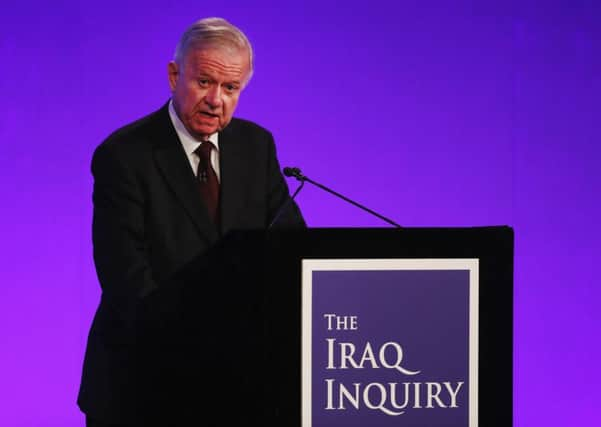Key points into Sir John Chilcot's seven-year inquiry into the conflict


Here are the key points:
• The UK chose to join the invasion of Iraq before “peaceful options for disarmament had been exhausted” and “military action at that time was not a last resort”.
• Saddam Hussein posed “no imminent threat” at the time of the invasion.


Advertisement
Hide AdAdvertisement
Hide Ad• No support for Blair critics’ claim that he agreed a deal “signed in blood” to topple Saddam with US President George W Bush in April 2002. But in July 2002 Blair wrote to Bush: “I will be with you whatever.”
• The UK’s decision to act, despite no second UN resolution backing military action in March 2003, had the effect of “undermining the Security Council’s authority”.
• Attorney General Lord Goldsmith’s decision that there was a legal basis for UK involvement in invasion was taken in a way which was “far from satisfactory”.
• Blair’s September 2002 Commons statement and dossier on Iraq’s weapons of mass destruction (WMDs) made judgments that “were presented with a certainty that was not justified”.


Advertisement
Hide AdAdvertisement
Hide Ad• The Labour Government’s policy on Iraq was made on the basis of “flawed intelligence and assessments” that should have been challenged.
• The consequences of the invasion were “under-estimated”, and planning and preparation for after the overthrow of Saddam were “wholly inadequate”.
• The Government’s war preparations “failed to take into account the magnitude of the task of stabilising, administering and reconstructing Iraq”.
• Problems that arose following the invasion, including internal fighting, Iranian influences, regional instability and al Qaeda activity, were flagged as risks before the invasion.
Advertisement
Hide AdAdvertisement
Hide Ad• Whitehall mandarins and departmental ministers “failed to put their collective weight behind the task” of stabilising British parts of post-war Iraq.
• The Ministry of Defence was slow to respond to the threat of Improvised Explosive Devices (IEDs) to troops.
• Delays in providing better-protected patrol vehicles “should not have been tolerated”.
• It was “humiliating” that by 2007 British troops in Basra had to use prisoner exchanges to get militias to stop targeting them.
Advertisement
Hide AdAdvertisement
Hide Ad• Blair “overestimated his ability to influence US decisions on Iraq”.
• Troops in Iraq nicknamed the Army’s lightly armoured “snatch” Land Rovers “mobile coffins” because of the limited protection they gave.
And the Chilcot Report was scathing in its criticism of military and political leaders for failing to act before 30 soldiers were blown up in them by roadside bombs.
Initial work on sourcing more robust vehicles began in 2002, a full 12 months before the invasion of Iraq. But the inquiry revealed it wasn’t until 2006 that the improved Protected Patrol Vehicles (PPVs) were ordered - and only then after ministerial intervention.
Advertisement
Hide AdAdvertisement
Hide AdIn his summing up of the seven-year Iraq Inquiry, Sir John Chilcot pointed a finger at the top brass for their inability to react to the threat.
He said: “Between 2003 and 2009 UK forces in Iraq faced gaps in some key capability areas, including protected mobility. It was not sufficiently clear which person or department within the MoD had responsibility for identifying and articulating capability gaps.
“Delays in providing medium weight protected patrol vehicles and the failure to meet the needs of UK forces in Multi-National Division South East (the British sector - should not have been tolerated.
“The MoD was slow in responding to the developing threat in Iraq from improvised explosive devices. The range of protected mobility options available to commenders in MND (SE) was limited.
Advertisement
Hide AdAdvertisement
Hide Ad“Although work had begun before 2002 to source an additional PPV, it was only ordered in July 2006 following ministerial intervention.”
The report added that, while there were no funding barriers to introducing the new PPVs, it criticised the Executive Committee of the Army Board for concentrating instead on its Future Rapid Effect System programme which was focused on bigger armoured vehicles in readiness for deployment in Afghanistan.
• A Lancashire soldier’s grieving grandad thanked Sir John Chilcot in person for bringing former Prime Minister Tony Blair to book over the Iraq War.
Robert Wright, who lost his soldier grandson Stephen to a roadside bomb near Basra in 2006, came face-to-face with the inquiry chairman in London yesterday, just minutes after he delivered a damning verdict on Britain’s involvement in the overthrow of Saddam Hussein.
Advertisement
Hide AdAdvertisement
Hide AdAs Sir John came off the stage at the Queen Elizabeth II Conference Centre, Robert, 77, stepped in.
“I just had to go and thank him and ask a question – that’s just what I’m like,” said Robert.
“On behalf of all the families of the 179 troops who died out there I wanted to ask if his report now leaves it open for legal action to be taken against Tony Blair.
“Sir John wouldn’t comment himself on that one. But he did say he felt for all the relatives of the servicemen and women who were killed in Iraq.”
Advertisement
Hide AdAdvertisement
Hide Ad• Families of some of the 179 Britons killed during the Iraq war have been reacting after the long-awaited report into the conflict was published on Wednesday.
Several grieving mothers, fathers, partners and other family members streamed into the Queen Elizabeth II centre in London where they were given an early glimpse of the 2.6 million-word, 12-volume tome.
In it, report author Sir John Chilcot criticised Tony Blair - the Prime Minister in 2003 who presented the case for war and led the invasion - for committing to backing US counterpart George W Bush over Iraq.
It also criticised Government ministers’ justification for, planning and conduct of a military intervention which “went badly wrong, with consequences to this day”.
Advertisement
Hide AdAdvertisement
Hide AdSeveral military operations were described in the report as “hastily prepared” and led to equipment shortages for British personnel - an issue which several victims’ families have long campaigned over.
However, the report stopped short of making a judgement on the legality of the war.